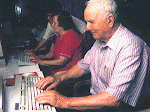Kalamazoo, MI- Bref Albright was taking an unfamiliar route home from work because of a stalled 18-wheeler when he passed by the cell phone tower. As the electromagnetic field washed over him, symptoms of his sensitivity quickly set in. He first noticed a tingling sensation throughout his body and an odd dryness in his mouth and throat. Then nausea and headache. Once the palpitations and difficulty concentrating on the road began, he knew he had to pull over in order to avoid an accident.
 |
| An elderly woman, shown here wearing an alternative medical emergency alert system, is about to be strangled by a conventional doctor and/or pharmaceutical industry representative |
"Getting off the road was the right thing to do," Albright explained. "I couldn't risk injuring somebody else if I lost control of my truck, but it left me vulnerable. I was a sitting duck!" As expected, Albright's condition worsened because of the continued exposure to the deadly yet fundamental force of nature. Despite blurry vision and difficulty remembering his wife's cell phone number, he managed to place a call. No answer. His wife, home brewing kombucha, had left her phone in another room.
Albright, a 53-year-old taxidermist for the Kalamazoo Parks Commission, then pressed the red button that activated his alternative medical emergency alert system. Within seconds, a satellite had pinpointed the location of Albright's pendant and a team of emergency alternative medicine experts was soon on its way. While on route, a member of the team was even able to contact Albright's wife Norleen and ask a few questions about Bref's alternative medical history.
"Speaking to family members can be very helpful in approaching these situations," Emergency Chiropractic Technician Frank Grimes revealed. "Yes, we have a detailed file on each customer, but sometimes people forget to update their records when new issues come up. Mrs. Albright was able to inform us of Bref's recent exposure to a genetically modified corn fritter."
Norleen credits her husband's alternative medical alert system for saving his life on multiple occasions. In the past year, Bref has accessed the system nearly one hundred times for concerns ranging from gluten exposure to concerns about chronic Lyme disease. "Sometimes it's just nice to hear somebody tell us that everything is going to be okay as long as we follow their recommendations unquestioningly."
When the team arrived at the scene, they found Bref conscious but scared and a bit unsteady on his feet. Company president and Naturopathic physician Mort Fishman, who leads the team and is certified in Acupuncture Cardiovascular Life Support (ACLS), says that in situations like this there is a golden hour where appropriate intervention can make the difference between life and total irreversible chakra degradation. "This was one of those days where everything went right. It was a good day. They aren't all good days, but we focus on the saves. You've got to focus on the saves."
The key to the success of alternative medical alert systems like the one that saved Albright's life that day, in addition to the highly trained men and women who respond to calls, is the customer's motivation to use the system. Fishman says that when a customer fails to respond to therapy, and when the rare fatality occurs, there is almost always a frustrating explanation. "Sometimes they don't adhere to our treatment recommendations. Sometimes they wait too long to activate the system. In fact, I haven't seen a case of treatment failure yet where it wasn't ultimately their fault."
Long known in the world of conventional medicine, alert systems have traditionally been used by the elderly to notified a 24-hour call center in the event of a fall or when they mistake people talking on a television or radio in another room for an intruder. Many of these remain popular today, such as the GeriAlert system popularized by it's now famous slogan, "I've fallen and my own son never visits me anymore!" Alternative medical alert systems, although only around for a few years, have revolutionized the care of people who are really worried about things that their regular doctor has probably never even heard of.
Cutting edge technology is one of the ways that alternative medical alert systems are outpacing conventional competitors. Fishman's company, EmergenQi, has recently added an automatic alert feature to it's higher end products, which can cost an excessively worried customer as much as $500 dollars a month. This grants a customer access to the system but they are charged a fee for each time it's activated. "The auto alert feature detects over a thousand imbalances, toxic exposures, even overgrowth of yeast in the blood," Fishman says. "And our own studies show it to be nearly 100% accurate."










